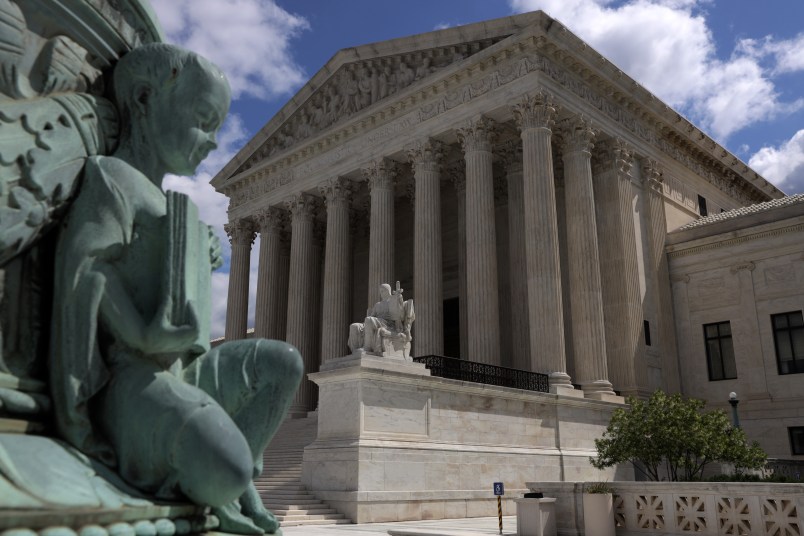Even before it’s determined whether President Trump will get to fill the seat left vacant by the Justice Ruth Bader Ginsburg’s death, her absence could have a big impact on disputes already before or likely headed to the Supreme Court.
When Justice Antonin Scalia died in 2016, the 10 months the court was down to eight justices created four-four splits that deferred to how the lower court handled the issue, including in some major cases.
Here are three ways Ginsburg’s death could shift the dynamics of issues that are now on their way to the Supreme Court.
Obamacare: The Supreme Court already has scheduled for oral arguments in November a major challenge to the Affordable Care Act. Texas and other GOP states are seeking to dismantle the Affordable Care Act under the dubious theory that, when the congressional Republicans zeroed out Obamacare’s individual mandate, they rendered the entire law unconstitutional.
Because Chief Justice John Roberts had voted in favor of upholding Obamacare when the arguments against it were more plausible, legal observers — and even Senate Republicans — did not see much of a chance of him casting a deciding vote to demolish it. But if the four other conservatives side with Texas, that will create a 4-4 split that will defer back to the lower courts. A district court had fully invalidated the law. The conservative U.S. Court of Appeals for the 5th Circuit punted, sending it back to the district court for review before the Supreme Court took the case.
Election Disputes: A half dozen emergency legal disputes over election rules have been kicked up to the Supreme Court. In most cases, the conservative court has stuck together to side with the party wanting to maintain restrictive voting laws that have been relaxed by lower courts. So, Ginsburg’s death doesn’t change that dynamic.
However, the one exception to the trend was a case out of Rhode Island, where the RNC was trying to overturn a consent decree the state had reached with voter advocates that opened up absentee voting. Three conservatives noted their dissents publicly, but it’s possible that a fourth conservative also would have ruled in the RNC’s favor (justices aren’t required to note their dissents publicly in these kinds of emergency disputes). So Ginsburg’s death may open up the door for the RNC or other outside groups to overturn at SCOTUS the legal agreements states have reached to make voting easier.
Perhaps the even bigger question is what her death means for any hypothetical disputes — a la Bush v. Gore — that arise after the election. The speculation on how those would play out center on Chief Justice Roberts’ instinct towards stirring the court away from highly politicized decisions when possible. But he may lose some leverage if the other conservatives can band together to deadlock a case. This means the way lower courts handle major post-election disputes will take on extra importance.
Census: It’s already guaranteed that the Supreme Court will be the final word on whether President Trump can exclude undocumented immigrants from the congressional apportionment —a move widely believed to be unconstitutional and violation of federal statute. But the timing of when the matter will be decided by the Supreme Court is still up in the air. The Justice Department formally noticed its appeal to the Supreme Court this week.
Last week, a three-judge panel ruled that Trump’s policy violated the law. (The panel opted not to decide the constitutional questions.) Because the case deals with apportionment, it goes directly to the Supreme Court after getting its initial review from a three-judge panel. And the Supreme Court has to issue some sort of judgement on the dispute — though it’s up to the court whether to have full arguments on the case or to issue a decision more quickly. The justices will also have before them fairly soon a decision whether to immediately block the Trump policy while the case is on appeal.
The opportunity Trump has to put on the court a justice more likely to rule in his favor makes the decisions about timing and whether to block the policy now much more consequential.







Nov 2000 redux, with a 5-3 or – not impossible – 6-3 conservative majority?
Conservative is a nice word for the likes of Thomas and Kavanaugh and the rest.
I’m sure tRump and Mitch envision a Bush v Gore scenario.
End game.
So we’re good, right?
I was going to come here and grouse about my being in an extended funk with all the shit that’s been happening. This week, I detected a noticeable crescendo and then I read the news. The fucking news.